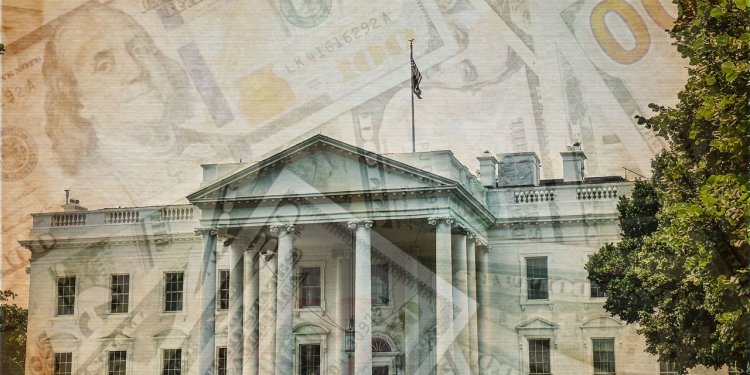The White House Tells the Truth About Climate Change
A report reveals that global temperature changes barely affects economic growth. By Steven E. Koonin July 6, 2023 6:28 pm ET Photo: Getty Images The journalist Michael Kinsley famously noted that “a gaffe is when a politician tells the truth.” By that standard, the White House committed a doozy in March when it released a paper on climate change’s effect on the U.S. economy. Its findings undermine any claims of an ongoing climate crisis or imminent catastrophe. The report, produced by the Council of Economic Advisers and the Office of Management and Budget, assesses how the economic consequences of climate change could be integrated into federal budgeting. The report’s first figure—reproduced nearby—shows 12 independent peer-reviewed estimates of how America’s gross domestic product would decline as the global temperature rises.


Photo: Getty Images
The journalist Michael Kinsley famously noted that “a gaffe is when a politician tells the truth.” By that standard, the White House committed a doozy in March when it released a paper on climate change’s effect on the U.S. economy. Its findings undermine any claims of an ongoing climate crisis or imminent catastrophe.
The report, produced by the Council of Economic Advisers and the Office of Management and Budget, assesses how the economic consequences of climate change could be integrated into federal budgeting. The report’s first figure—reproduced nearby—shows 12 independent peer-reviewed estimates of how America’s gross domestic product would decline as the global temperature rises.

*
Photo: whitehouse.gov
While the estimates differ, each shows an economic impact of less than a few percentage points for a few degrees of warming. The consensus, apart from two counterbalancing outliers, is that today’s warming of 2.2 degrees Fahrenheit has reduced GDP by less than 0.5%. That is trivial, considering real GDP has grown by more than 800% since 1950. If warming reaches 4.5 degrees—about what the United Nation’s climate panel projects for 2100 under plausible scenarios for future global emissions—the consensus reduction amounts to less than 2%. In other words, if the average annual GDP growth rate is 1.5% for the next 80 years, the economy would grow 232%. A 2% climate-change effect would reduce that growth to 225%. As physicists say, that’s a difference “in the noise.”
Economic modeling combined with climate modeling can only be described as a doubly dismal enterprise, rife with uncertainties and untestable assumptions. The White House report offers caveats appropriate to its projections, including that the impact estimates are uncertain, that the consequences of climate may be uneven across sectors and regions, that GDP isn’t the only measure of climate’s effect, and that some types of impacts are omitted.
But, critically, the report also omits America’s amazing capacity to adapt, if not thrive, under a changing climate. The U.S., excluding Alaska and Hawaii, has warmed about 2 degrees Fahrenheit since 1901. Despite that warming, the nation has flourished: Its population has quadrupled, its average life expectancy soared, to 79 years from 48, and its economic activity per capita multiplied around sevenfold. The Intergovernmental Panel on Climate Change projects a comparable warming for early next century, but our nation’s experience should lead us to believe that climate change will be only a minor detriment to national welfare. Even hypothetical tipping points—practically irreversible changes such as disintegration of the Greenland ice sheet—are projected to have only minimal effect on the global economy.
A later section of the White House report reinforces how little future greenhouse-gas emissions are expected to affect the U.S. economy in coming decades. It projects that today’s “debt-to-GDP ratio” will rise to 111.2% at midcentury if the world is on a path to achieve net-zero emissions by 2075, while it would rise to 112.6% under an equally unlikely high-emissions scenario. There is little doubt that many factors other than climate—such as technology and trade—will be far more consequential for the economy and debt over the next 25 years. The 1.4% difference between these two extreme scenarios is, again, in the noise.
The report’s authors should be commended for honestly delivering likely unwelcome messages, even if they didn’t make a show of it. The rest of the Biden administration and its climate-activist allies should moderate their apocalyptic rhetoric and cancel the climate crisis accordingly. Exaggerating the magnitude, urgency and certainty of the climate threat encourages ill-considered policies that could be more disruptive and expensive than any change in the climate itself.
Mr. Koonin is a professor at New York University, a senior fellow at the Hoover Institution, and author of “Unsettled: What Climate Science Tells Us, What It Doesn’t, and Why It Matters.”
Journal Editorial Report: Progressive policies helped create the orange smoke storm. Images: AP/NurPhoto via ZUMA Press Composite: Mark Kelly The Wall Street Journal Interactive Edition
What's Your Reaction?

















